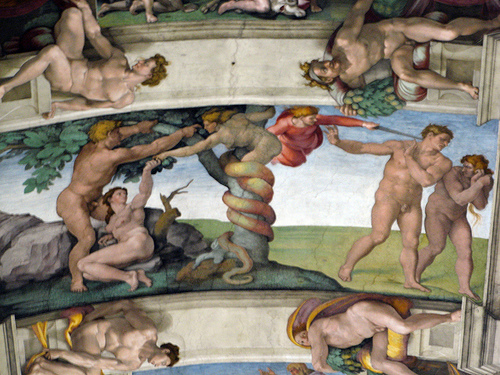We run our website the way we wished the whole internet worked: we provide high quality original content with no ads. We are funded solely by your direct support. Please consider supporting this project.

Sinful Nature and Free Will
Q: If our sinful nature is what causes us to sin/reject God, can we be held responsible for our sins, when this nature resulted from Adam and Eve’s sin? Do we really have the freedom to either choose/reject God if our sinful nature compels us to reject God?
On the other hand, if our sinful nature only influences, but does not cause us to sin, wouldn’t that mean that it is theoretically possible, however improbable, to choose to live a completely sinless life (because of the free will that we have)? How come every single human being that has ever lived will use the freedom that they have to go “that way” instead of “this way”?
Lastly, correct me if I’m wrong, but Scripture seems to suggest that if any of us were in Adam and Eve’s place, we would have chosen to do the same thing and eat of the forbidden fruit. However, if that was the case, did we really have free will to go “this way or that way”, when it seems impossible for any of us to have chosen not to eat the fruit?
A: Here are three considerations regarding “sinful nature” and our free will:
1) I do think it is theoretically possible for an individual to live a sinless life. Yet, this isn’t inconsistent with admitting that every one will inevitably sin. Think of it like this. Every car crash (let us assume) is preventable, if only drivers were more careful. Hence, it is theoretically possible that there will be no car crashes any where on the earth today — or this month — or this year — or ever. But it is certain there will be car crashes, for which drivers are responsible. The thing is, statistical certainty doesn’t negate individual responsibility. We are responsible for every sin we commit, for we didn’t need to do it. We could have done otherwise. It’s theoretically possible to go the rest of our lives without sinning. Yet, it’s certain that, over our lifetime of decisions, we will sin.
2) I see “original sin” as a) our being born screwed up in a myriad of ways, including spiritually; and b) being born in a screwed up world that is oppressed with fallen powers. This doesn’t make us sin, for sin is only sin if we could do otherwise. Yet, it does render it certain that we will eventually sin (see above). This is, in part, why we need a savior.
3) Finally, its important that we not think about this only in individualistic terms. From a biblical perspective (and now, with much confirmation from science), the human community is, in a sense, one person, extending back to Adam. We influence each other, and are responsible, in varying degrees, for one another. So we have collectively gotten ourselves into a situation where we can’t avoid sin, and the responsibility is shared by all of us. This is what Paul means when he says we were in Adam. Yet, we are now placed in Christ — all of us (I Cor. 15:22; Rom 5:14-20). It’s just that we all (including believers) tend to see ourselves and our world as though we were yet in Adam. Transitioning from Adam-thought to Christ-thought is what discipleship is all about.
Image by Randy OHC via Flickr
Category: Q&A
Tags: Adam and Eve, Free Will, Sin, Sinful Nature
Topics: Providence, Predestination and Free Will, Sin
Related Reading

The Ultimate Goal of Life & What Stands in the Way of It
What is the point of it all? What is the highest good? What is the point of life? Greg addresses these huge question in this sermon clip, where he introduces the idea of the beautific vision. The point of everything is to enjoy loving God in his is enjoying and loving us. But of course…

Judgment and Idolatry
Why was the forbidden tree in the center of the garden called The Tree of the Knowledge of Good and Evil? Since the Bible depicts eating from this tree as the reason humans are estranged from God and the cause of all that’s wrong with humanity, eating from this tree is obviously a terrible thing.…

Podcast: Will We Have Free Will in Heaven?
Greg discusses the afterlife and the type of freedom we might have there. http://traffic.libsyn.com/askgregboyd/Episode_0103.mp3

Did the Crucifixion Allow God to Atone for His OWN Sins? (podcast)
Greg considers God’s nature and if he could sin. Dan confesses an old gambling habit. Episode 477 http://traffic.libsyn.com/askgregboyd/Episode_0477.mp3

Is the Bible against body piercing and tattoos?
Some Christians argue against body piercing and tattoos on the basis of a couple of Old Testament verses that prohibit them (Lev. 19:28). Several years back an aggravated lady tried to get me to preach against these things in my church (she’d observed that a number of people in the congregation had body piercings and…

God Does Not Always Get What He Wants
One of the ways the Bible makes it clear that humans have free will and that God doesn’t predetermine human decisions is found in the responses God has toward human choices. Scripture consistently depicts God as being frustrated by the way his people obstinately resist his plans and Scripture often depicts God’s heart as breaking…
